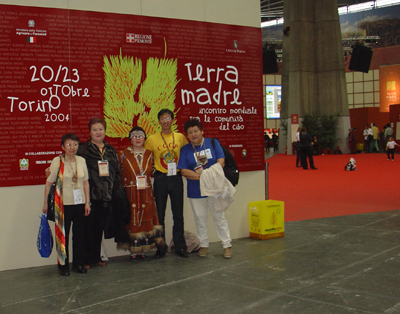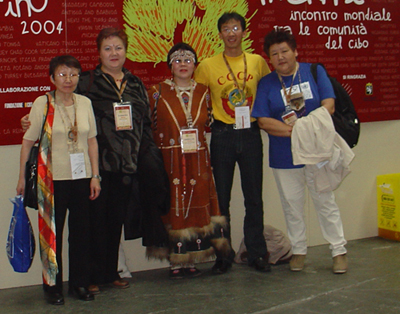

Impressions from “Terra Madre”:
World Meeting of Food Communities
L.G. Ignatenko, Chairman of the Aleskam Community,
 |
 |
Thanks to our partners from the The World Conservation Union (IUCN), and Nikolai Shmatkov personally, we, the residents of
Unfortunately, the conference workshop The Spices Route was not translated into Russian, so I was unable to exchange my ideas or other information with other producers working along similar lines. However, we had the opportunity to attend other sessions, which were plenty. Sometimes we did not know what session to attend and what would be most useful to us to listen to: in fact there were 61 workshops and they all were of great interest to us. We attended seminars on fishery, honey and its medicinal properties, agrarian economic systems, herb teas, etc.
I wanted very much to attend the session called The Treasures of Volcanoes, where the issues of the diversity of volcano areas and the possibilities of living alongside volcanoes were discussed, as well as Gathering Economies: Cultures to Defend and Lands to Protect, but the range of sections was so immense that it was impossible to participate in all of them.
It was extremely interesting to find out in what way my colleagues from
Briefly, the trip to the subsistence conference has provided an invaluable contribution to our solidarity and the expansion of our knowledge. We experienced some unique exchanges of producers and consumers. Attending the Taste Show Food Exhibition surpassed all imagination. I have never seen anything of the kind before. It is hard to convey our impression of the two activities complementing each other. I have never seen anything like that before. On the one hand, the Terra Madre meeting leads one to think of an alternative agriculture and quality products, on the other the Taste Show is concerned with the promotion of quality products and development of consumer tastes.
The meeting encouraged us to think of the future which we are all looking forward to seeing: biological diversity, the preservation of the Earth and its resources, a guarantee of equal and worthy labor conditions for everybody.
The organizer of such a wonderful conference was the noncommercial international association Slow Food, established in 1986 to resist the global standardization of foods and to supply reliable information to the consumer. The President of the Association is Carlo Petrini. As of today, Slow Food has 80 000 members from over 100 countries of the world. The Association is based on the principles of sustainable methods for the development of agriculture and protection of biological diversity. For that purpose, a Fund for the protection of biological diversity has recently been established, which is a noncommercial organization and supports all the Slow Food projects in the agricultural and food sectors.
Slow Food Editore has published over 100 publications and is preparing eight issues of the magazine Slow Food for Italian readers, and also Slow , the herald of culture and taste, the international magazine of the association, which appears four times a year in six languages. In countries where the movement has been most developed, the members of the association receive national information heralds.
Slow Food is the organizer of the biggest gastronomical exhibitions, among which is the world-important event concerned with quality foods and held every two years in
In conclusion, I would like to extend my sincere thanks to all those who supported us, preparing the necessary documents and sending printed matter on the meeting to come: the representatives of the Slow Food fund and personally to Julia Smelkova, and also our Russian coordinator Nadezhda Zhdanova. We are thankful again to the IUCN and personally to N. Shmatkov for the opportunity to participate in another unique conference, which made it possible to participate in the international exhibition Forest Gifts: the Culture of Utilization in the city of Moscow, where our products (syrup of the dwarf Siberian pine, spices from wild herbs in The Taste of Kamchatka, Kamchatka Phyto Tea, and birch bark works by Elena and Nikolai from the village of Milkovo were awarded gold and silver medals at the All-Russian Exhibition Center. Thanks are also due to the Head of the Center of the Wild Salmon―this is our partner who not only supports our ideas on the traditional Salmon festivals, but also actively endorses our concepts of the search for alternative subsistence sources. For instance, in summer the center allocated funds for trips to remote places for the gathering of wild herbs, some of which we apply in our Taste of Kamchatka spices. We are looking forward to further mutual understanding and cooperation. In fact, the potential for traditional subsistence has been much spoken about. But few people understand it and few people stick to it.